It is a challenge to keep track of the times that Narges Mohammadi, the renowned human rights activist and Nobel Peace Laureate, has been arrested by the Islamic Republic, tried and sent behind bars where she is currently serving a prison sentence. On January 15, her family reported she had been handed an additional 15-month prison sentence on charges of spreading propaganda against the regime, given a two-year travel ban, and barred from using a smartphone for two years.
This was her fifth conviction since March 2021, with sentences now amounting to 12 years and three months in prison, 154 lashes, two years of exile, and various social and political restrictions.
Mohammadi was born in 1972 in the city of Zanjan to a family of political activists. She grew up in Karaj, near Tehran, and in the Kurdish cities of Qorveh and Oshnavieh. After the Islamic Revolution of 1979, a number of her relatives who had supported the opposition People’s Mojahedin of Iran group were executed. An uncle who had spent some time in prison before the revolution had the most influence on her views about human rights. He, too, was executed by the Islamic Republic after spending five years in prison.
After receiving her high school diploma, Mohammadi studied applied physics at Qazvin International University and became a professional engineer. At school she became a student activist and founded the Student Organization for Enlightenment. In 1997 she joined the campaign of the reformist candidate Mohammad Khatami, who was elected president.
Arrests Start
At the same time, she also wrote for reformist publications and published a book of her political essays entitled The Reforms, the Strategy and the Tactics. Many of her articles were critical of the Iranian regime. Her first arrest was connected with her journalism. After a few days of detention, she was given a suspended sentence of one year in prison.
In the course of her political activities, Mohammadi came to know the reformist journalist Taghi Rahmani, whom she married in 1999. Soon afterward, in 2000, Rahmani and other members of a coalition known as the National-Religious Movement were arrested. He spent 14 years in prison. After his release, he moved to France, while his wife stayed in Iran.
Mohammadi changed the focus of her activism after her husband’s arrest. She had already been active in supporting the families of prisoners of conscience, which in 2001 led her to work with the Defenders of Human Rights Center (DHRC), an organization founded by Shirin Ebadi, the first Iranian woman to be awarded the Nobel Peace Prize. Mohammadi was the only member of the center who was not a lawyer. She founded other groups under the umbrella of the center, including the National Peace Council, the Committee to Defend Political Prisoners, the End Child Executions Committee and the Committee to Defend Free and Fair Elections.
On December 21, 2008, as the DHRC planned to hold a ceremony for the 60th anniversary of the Universal Declaration of Human Rights, security forces raided the center’s offices and shut it down without a court order. Over the following week, they searched the offices and seized computers and other items. On January 1, 2009, members of the paramilitary Basij force further ransacked the office as the police looked on.
In April 2010, Mohammadi was summoned to the Revolutionary Court for her activities at the DHRC. She was released on bail, but some days later was re-arrested and taken to Tehran’s Evin prison. There, her health deteriorated as she developed an epilepsy-like disease, causing her to periodically lose muscle control. Her condition forced the authorities to allow her to be hospitalized after a month in prison.
In July 2011, Branch 26 of the Revolutionary Court found her guilty of conspiracy against national security, illegal activities through the DHRC and propaganda against the regime. She was sentenced to 11 years in prison, but the appeals court reduced the sentence to six years in March 2012. In April, she was apprehended again and was told that she must start serving her sentence.
The arrest took place at her home and in front of her two children Kiana and Ali. They had witnessed their parents being arrested before, and were somewhat used to being the only ones present to bid one of their parents farewell.
Mohammadi’s imprisonment sparked an international outcry.
She was transferred from Evin to a prison in the city of Zanjan. But her health deteriorated further and eventually doctors concluded that she could not survive in prison. She was released in July 2012.
In 2014, when Catherine Ashton, the High Representative of the European Union for Foreign Affairs, visited Iran, Mohammadi accompanied her to a cemetery where she delivered a speech at the grave of Sattar Beheshti, a blogger who was tortured to death in prison. “How is it that parliament members are suggesting a Plan for the Promotion of Virtue and Prevention of Vice, but nobody spoke up two years ago, when an innocent human named Sattar Beheshti died under torture at the hands of his interrogator?” she asked. The video of her speech was widely circulated on social media.
Despite her health problems, she continued her work and protested against human rights violations in Iran. In October 2014 she participated in a protest rally outside parliament in reaction to acid attacks carried out against women in Isfahan.
Mohammadi’s refusal to be silenced led to a new arrest on May 5, 2015. The next day, human rights activists gathered outside the prison to protest her incarceration, and 250 activists and journalists signed a statement demanding her release.
“Cooperation With the Islamic State”!
Besides charging her with conspiracy against national security and membership in the campaign to abolish the death penalty, the judiciary also opened a strange new case against her: cooperation with the Islamic State (ISIS).
While out of prison, Mohammadi started a campaign named Legam (acronym for the “Campaign for Step by Step Abolition of the Death Penalty” in Persian). “One of the most serious causes I have fought for in my life has been the abolition of the death penalty in Iran,” she later wrote. “It is unacceptable to end a life, no matter what the justification may be…death penalty is violence. As violent as war on a smaller scale.”
In the course of this campaign, she spoke against the death sentences imposed on a number of Sunnis charged with collaborating with the extremist group Islamic State (IS). The judiciary used this to charge her with “cooperation” with the IS and "assembly and collusion against national security." The Revolutionary Court sentenced the activist to a total of 16 years in prison and, in the fall of 2016, the sentence was upheld by the appeals court.
Mohammadi was tried in other courts presided over by the infamous Judge Abolghasem Salavati and was handed multiple prison terms, including 10 years for “founding and managing the illegal group Legam.”
In the early winter of 2019, Mohammadi was transferred from Evin prison to Zanjan to make her communications with her family more difficult. Two months later, two new cases were opened against her. In the first one, she was charged with “issuing political statements, organizing classes and holding protest sit-ins at Evin prison’s women’s ward.” In the second case, Evin’s chief warden, the plaintiff, accused Mohammadi of slander because she had claimed that she had been tortured and beaten in prison. She refused to attend the trials.
Finally, on October 8, 2020, Mohammadi was released after serving five years and six months of her sentences. Her freedom, however, did not last long. On November 17, 2021, Mohammadi was arrested in Karaj while attending a memorial for Ebrahim Ketabdar, who was killed by Iranian security forces during nationwide protests in November 2019.
After being beaten and detained in Karaj, she spent two months in solitary confinement in Evin prison. She was then transferred to Qarchak women’s prison in Varamin, an infamously squalid and under-resourced facility where reports of overcrowding and sexual abuse by guards are commonplace. This time Branch 26 of Tehran Revolutionary Court sentenced Mohammadi to eight years in prison, 74 lashes and two years of exile.
From inside the prison and between bouts of illness — without adequate or any medical care — Mohammadi has actively spoken for justice and denounced injustices committed by the Islamic Republic both inside and outside prisons.
For instance, in December 2022, as the Woman, Life, Freedom protests were raging across Iran, Mohammadi wrote from prison to give the BBC details on how women detained during the uprising were being sexually and physically abused. She wrote that one well-known activist had her hands and legs tied to a hook above her head in the vehicle taking her to prison, and was then sexually assaulted by security officers. "Not revealing these crimes would contribute to the continued use of these repressive methods against women," she said. “In the absence of powerful independent civil organizations, the attention and support of the media and international human rights organizations and global public opinion is essential."
And in January 2023, as an eyewitness, she released a harrowing account of what was happening inside the women's ward of Evin prison. She recounted the fate of women who have been suffering from long periods of time in solitary confinement, harsh interrogations and the framing of detainees for crimes they did not commit.
Mohammadi has been an relenting critic of solitary confinement, calling it “White Torture” in her book with the same name. In this book, she builds up her campaign against solitary confinement partly with her own story, but mostly through interviews with 12 other Iranian women who have also experienced it. They came from different backgrounds and were jailed for a variety of reasons the Islamic Republic regards as crimes: being a member of the Baha’i religious minority, or a Sufi, or converting to Christianity, or supporting the People’s Mojahedin, or simply getting involved in protest movements.
The Nobel Peace Prize
In October 2023, the Norwegian Nobel Committee awarded its Peace Prize to Mohammadi “to honor her courageous fight for human rights, freedom, and democracy in Iran,” making her the second Iranian woman, after Shirin Ebadi, to receive this honor. The prize also recognizes “the hundreds of thousands of people who, in the preceding year, have demonstrated against Iran’s theocratic regime’s policies of discrimination and oppression targeting women.”
In a written statement sent from prison to the New York Times, Mohammadi said the “global support and recognition of my human rights advocacy makes me more resolved, more responsible, more passionate and more hopeful. I also hope this recognition makes Iranians protesting for change stronger and more organized…What the government may not understand is that the more of us they lock up, the stronger we become.”
Mohammadi’s teenage children, Ali and Kiana, received the Nobel prize on behalf of their jailed mother during a December 10 ceremony in Oslo, reading an acceptance speech their mother had managed to smuggle out of Evin prison.
"I write this message from behind the high, cold walls of a prison,” said Mohammadi in the speech read by her children. “I am an Iranian woman, a proud and honorable contributor to civilization, who is currently under the oppression of a despotic religious government.”
"I am a woman prisoner who, in enduring deep and soul-crushing suffering resulting from the lack of freedom, equality, and democracy, has recognized the necessity of her existence and has found faith…the Islamic Republic regime is at the lowest level of popular legitimacy and this government has responded to people's demands by suppression, execution, slaughter, and imprisonment."
“Ms. Mohammadi’s commitment to building the future that women and all people in Iran deserve is an inspiration to people everywhere who are fighting for human rights and basic human dignity,” US President Joe Biden said in a statement. “She has endured repeated arrests, persecution, and torture at the hands of the Iranian regime, yet Ms. Mohammadi’s advocacy and determination has only grown stronger.
Predictably, the Islamic Republic and pro-government media had a completely different reaction, claiming that Mohammadi had "collaborated with terrorist groups" and conducted "anti-Iranian activities." Foreign Ministry spokesperson Nasser Kanani called the decision to award Mohammadi "biased and political." And Tasnim news agency described her as a "security convict" who committed "subversive" activities, and claimed that the Nobel prize had a history of being handed to "criminals."
visit the accountability section
In this section of Iran Wire, you can contact the officials and launch your campaign for various problems




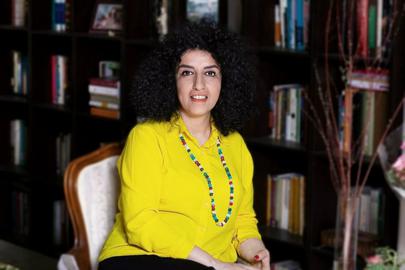
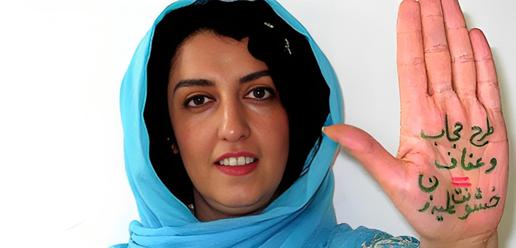











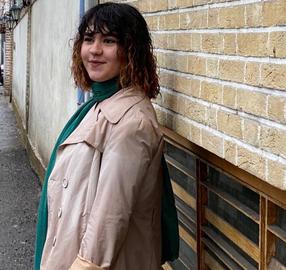
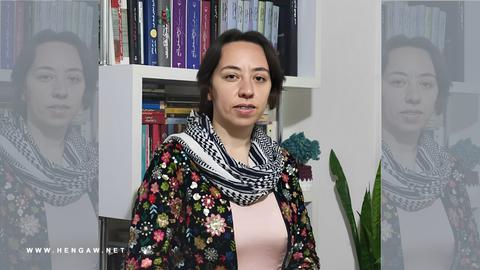





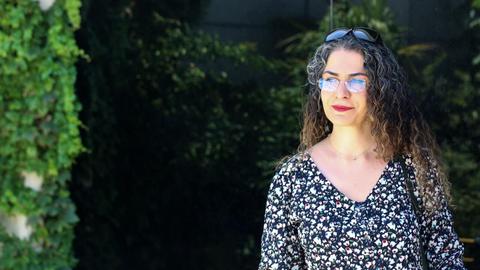
comments